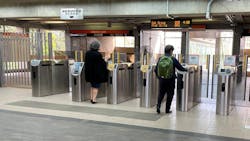MBTA Board of Directors approves plan to implement reduced fares program for riders with low-income
The Massachusetts Bay Transportation Authority (MBTA) Board of Directors has approved the agency’s plan to implement a reduced fares program for riders with low-income. The program builds upon the Healey-Driscoll Administration’s Fiscal Year (FY) 2024 budget that includes $5 million for the MBTA to develop the low-income fares program.
The new program will provide riders who are aged 26-64, non-disabled and have low income with reduced fares of approximately 50 percent off on all MBTA modes. Program participants will demonstrate eligibility via existing enrollment in programs, with a cutoff of 200 percent of the federal poverty level (or lower).
The new program applies to Commuter Rail and on the RIDE, the MBTA’s paratransit service, where senior and low-income riders will be eligible for half-price ADA and Premium trips.
“Expanding low-income fares will help to ensure that our transportation system is more equitable and more affordable, which supports the mission to give everyone greater access to mobility options, especially community members depending on transit,” said Massachusetts Department of Transportation (MassDOT) Secretary and CEO Monica Tibbits-Nutt.
“This is an important step towards making mass transportation more affordable for those that need it the most and I thank the Board of Directors for their support and approval of the new low-income fare program, especially MassDOT Secretary Tibbits-Nutt for her years of advocacy. I applaud the governor and the legislature for their foresight to include funds in our FY24 budget to enable us to develop this program and we thank the gGovernor for her proposal in the FY25 budget in support of this program, which will benefit so many across all modes,” said MBTA General Manager and CEO Phillip Eng. “The MBTA is committed to making meaningful improvements for riders, including making fares more affordable, which will improve quality of life, boost economic mobility and encourage more riders to return to the system.”
The fare changes will go into effect in summer 2024. The MBTA estimates the cost of the program to be approximately $52-62 million (including administrative costs, operating costs to meet induced demand and fare revenue loss). MBTA notes riders with low income are expected to take 30 percent more trips with a reduced fare, significantly increasing mobility while saving on transportation costs. More than 60,000 riders are expected to qualify for and enroll in the program, which is expected to result in up to 8 million more trips per year.
The program for riders with low income is a multi-secretariat effort with the Commonwealth’s Executive Office of Health and Human Services (EOHHS) and Registry of Motor Vehicles (RMV). Existing MBTA reduced fare programs already provide support to students, seniors, riders with disabilities and young people aged 18-25 with low income. The programs provide half-priced fares and passes.
MBTA will partner with third-party Community-Based Partners to manage in-person customer service and eligibility verification for the new program, includingh providing physical in-person locations where people can receive support with their applications and offering additional support whenever automatic systems are unable to successfully process applications.
Two additional fare changes include:
- Replacing “Change Tickets” with CharlieCards: As of March 1, 2024, the issuance of paper CharlieTickets with stored value as change (a “Change Ticket”) was phased out, which MBTA notes was due to limitations in the fare collection technology.
- Permanently expanding the $10 Weekend Commuter Rail Pass to include federal holidays: The $10 Weekend Commuter Rail Pass will now include federal holidays. The pass allows for unlimited Commuter Rail trips on all three days of federal holiday weekends. For federal holidays that are observed mid-week, passengers can purchase a $10 Holiday Pass for that day.
“Riders and workers in our Public Transit Public Good coalition celebrate this milestone in moving forward a low-income fare program at the MBTA. Reduced fares will be transformative for low-income riders throughout the MBTA service area and on all modes of public transit and especially for communities of color facing historical burdens of exclusion and poverty,” said Community Labor United Senior Organizer Ziquelle Smalls. “A low-income fare will advance mobility, equity and opportunity in the Commonwealth. We are so pleased to see the Healey Administration and the MBTA advance this essential policy.”
“The introduction of a low-income fare program is a huge step toward making the MBTA more affordable and equitable. We know that the MBTA is a lifeline for thousands of people and that this program will make it easier for all people, regardless of age or ability, to get where they need to go,” said LivableStreets Alliance Executive Director Stacy Thompson. “We look forward to working with the MBTA to support the launch of this important initiative.”
